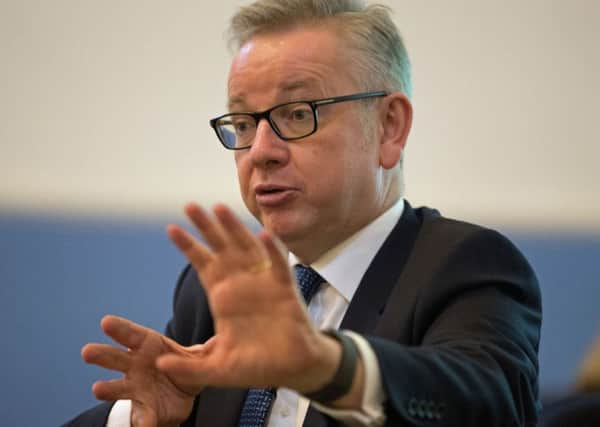Michael Gove: The more children get to visit, understand and appreciate our countryside, the more they will appreciate, support and champion our farmers


We’ll be saying more about our plans in a Command Paper to be published later this spring, but I want to say a little about the direction of travel I think we should take.
I believe we should help landowners and managers to make the transition from our current system of subsidy to a new approach of public money for public goods over time.
Advertisement
Hide AdAdvertisement
Hide AdWe will formally leave the EU in March of 2019 but the Government anticipates that we will agree an implementation or transition period for the whole country with the EU lasting for around another two years.
We have guaranteed that the amount we allocate to farming support – in cash terms – will be protected throughout and beyond this period right up until the end of this Parliament in 2022.
We will continue support for Countryside Stewardship agreements entered into before we leave the EU and we will ensure that no one in an existing scheme is unfairly disadvantaged when we transition to new arrangements. We will pay the 2019 Basic Payment Scheme (BPS) on the same basis as we do now.
And, after that transition, we will replace BPS with a system of public money for public goods.
Advertisement
Hide AdAdvertisement
Hide AdThe principal public good we will invest in is, of course, environmental enhancement.
In thinking about how better to support farmers in the work of environmental protection and enhancement, it’s critical to recognise that there is no inherent tension between productive farming and care for the natural world.
Quite the opposite. I have seen for myself how many of our best farmers – our most productive and progressive farmers – place thoughtful environmental practice and careful husbanding of resources at the heart of their businesses.
Building on previous countryside stewardship and agri-environment schemes, we will design a scheme accessible to almost any landowner or manager who wishes to enhance the natural environment by planting woodland, providing new habitats for wildlife, increasing biodiversity, contributing to improved water quality and returning cultivated land to wildflower meadows or other more natural states.
Advertisement
Hide AdAdvertisement
Hide AdWe will also make additional money available for those who wish to collaborate to secure environmental improvements collectively at landscape scale.
Enhancing our natural environment is a vital mission for this Government. We are committed to ensuring we leave the environment in a better condition than we found it. And leaving the European Union allows us to deliver the policies required to achieve that – to deliver a Green Brexit.
But vital as investment in our environment is, I believe we should also invest in technology and skills alongside infrastructure, public access and rural resilience.
Critical to making this new investment in tech and skills work is of course proper infrastructure – super-fast broadband and reliable 5G coverage. If I can get reliable and unbroken mobile phone and internet coverage in a tunnel under the Atlantic as I travel between one Faeroe Island and the next, I should be able to get it in Oxfordshire.
Advertisement
Hide AdAdvertisement
Hide AdPublic access I know can be contentious, but the more the public, and especially schoolchildren, get to visit, understand and appreciate our countryside, the more I believe they will appreciate, support and champion our farmers. Open Farm Sunday and other great initiatives like it help reconnect urban dwellers with the earth. And they also help secure consent for investment in the countryside as well as support for British produce. So public access is a public good.
Finally there is rural resilience. There are any number of smaller farm and rural businesses which help keep communities coherent. We need to ensure support is there for those who keep rural life vital. The work of the Prince’s Countryside Fund has been invaluable here and the kind of enterprises that it supports are, I believe, worthy of public support.
Like everyone, I am moved by the beauty of our natural landscapes, feel a sense of awe and wonder at the richness and abundance of creation, value wildlife as a good in its own right, admire those who work with nature and on our land, respect the skill and passion of farmers, growers, shepherds, stockmen, vets and agronomists who provide us with safe, high quality food and drink, and I want to see them prosper.
I know these feelings are shared across the country. But capturing these values in public policy can sometimes be difficult. Which is why the natural capital approach can be so valuable. It allows us to bed into policy-making a direct appreciation of the importance of field and forest, river and wetland, healthy soil and air free from pollution. It is just one tool among many in the formation of policy but a very powerful one in ensuring that we think of our responsibility to future generations to hand on a country, and a planet, in a better state than we found it.